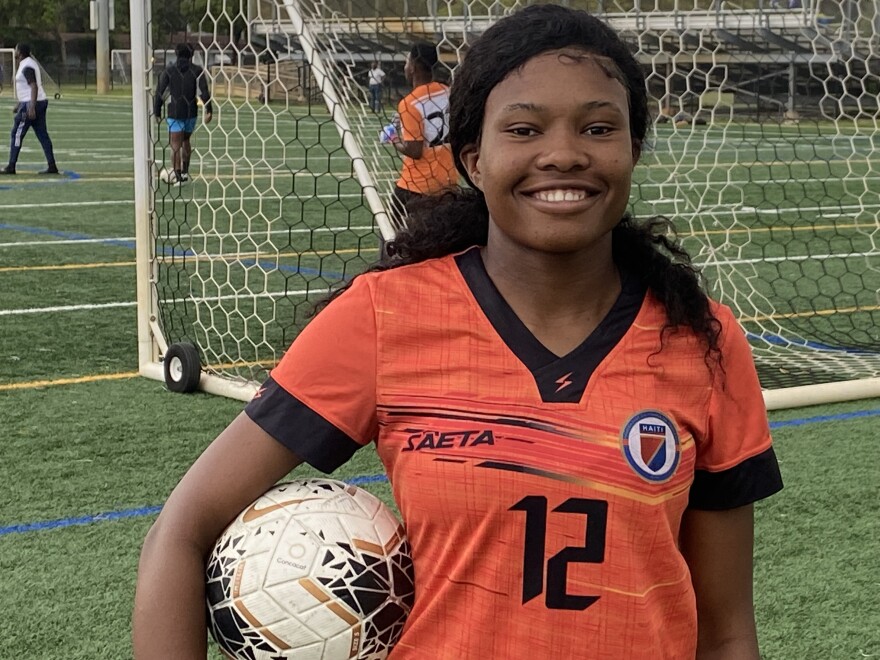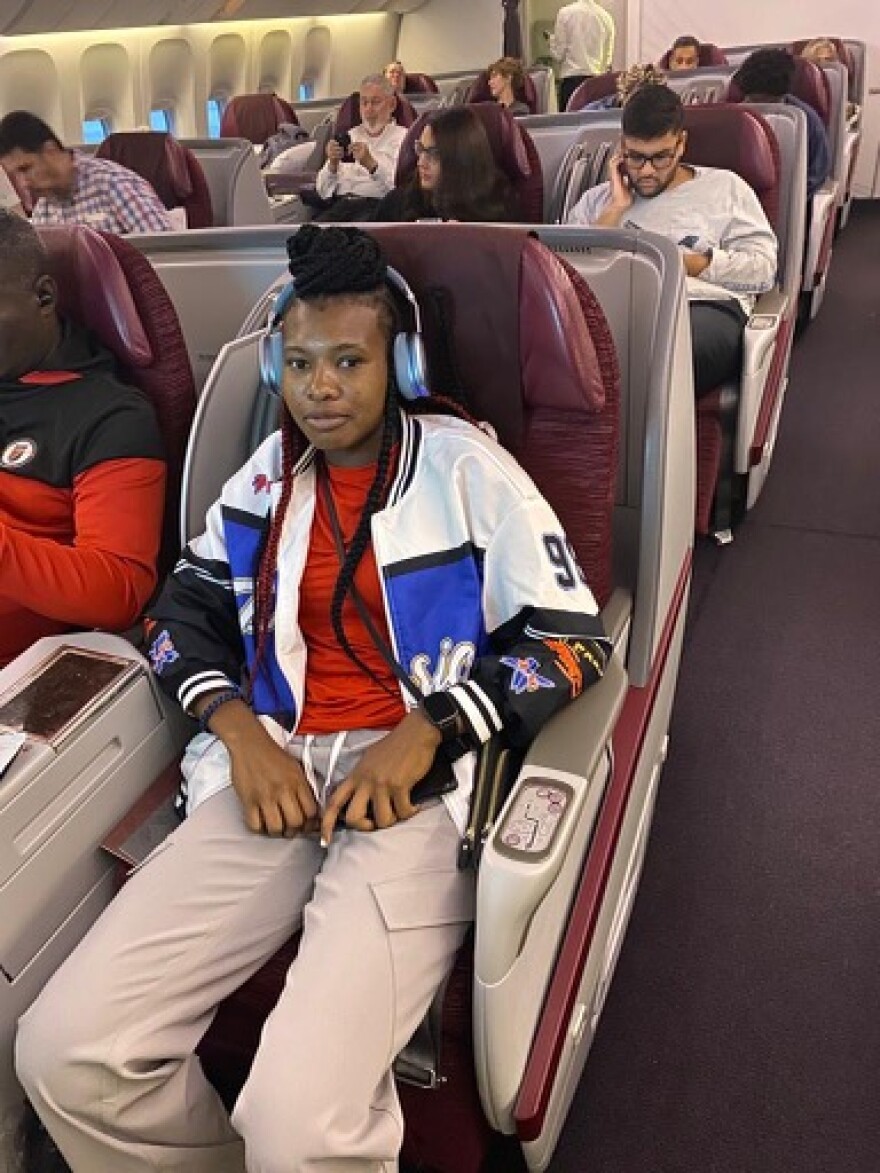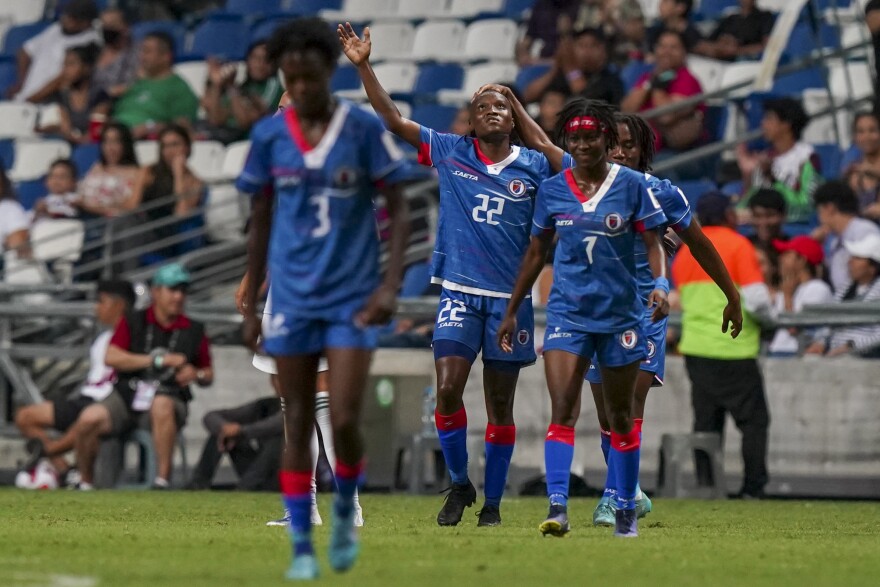When forward Melchie Dumornay scored her second, winning goal against Chile five months ago, the shout of "Goooooooool!" that erupted from TV announcers seemed especially heartfelt.
They knew, like everyone else, that the victory put the Haitian women’s national soccer team in the World Cup for the first time ever.
The Cup starts Thursday in Australia and New Zealand, and Haiti's women play their debut game on Saturday in Brisbane. Ranked 53rd in the world, they are no doubt one of the tournament's underdogs — and about to take on powerhouses like their first opponents, England, who are ranked 4th.
But psychologically, they've already brought something to their country that’s more important than a trophy.
“You know, in my country they don’t have a lot to be happy about right now" says forward Roselord Borgella, Haiti’s leading scorer, who spoke to WLRN from Dijon, France, where she plays professionally.
Borgella's observation is an understatement: Haiti's government and economy have all but collapsed, and much of the country is in the chokehold of violent gangs. Borgella, who grew up in poverty near Port-au-Prince — and who told WLRN were it not for soccer she herself might have been recruited by a gang — knows Les Grenadiers, as her team is called, are not just a reason for Haitians to be happy.
They're a reminder for Haitians to stay hopeful.
“They believe in soccer," she says. "So this is important — it can help Haiti to be better.”

Inside Haiti, most people seem to agree with her.
"The spirit we see in our woman players is the same spirit we see in who we are as Haitians," says Marie-Claire Dorcely of Port-au-Prince, who is chief administrative officer at the nonprofit Sevis Finansye Fonkoze that helps Haitian women entrepreneurs with micro-financing.
"That perseverance, that persistence, and pushing through — which is what's getting Haitians through their current crisis."
Dorcely calls the squad a sorely needed inspiration in that regard — and expects Haiti’s national mood to jump this weekend when the women takes the field in Australia.
“We’re on the world stage now for something positive, as opposed to making the news for everything negative for the last couple years," says Dorcely.
"It will have people excited about life again — it’s just going to bring another air for us, more pride for us.”
READ MORE: Soccer's helping Haiti keep its head up — and keep kids out of gangs
Some Haitians even wonder if a truce reportedly agreed on last weekend by Haiti’s top gang leaders was influenced by a desire to keep peace during the World Cup.
Either way, the women’s Cup appearance is also a morale boost to the Haitian diaspora in Miami, especially given the strong soccer ties between Haiti and South Florida — currently embodied by Nahomie Ambroise, who plays goalie for the Haitian women's team.
“This is a big dream," Ambroise says. "This is a destiny for me."
"Soccer is the most popular game in the world — so I am very proud, because I’m an example for all the girls in my country. This is a big dream for me."Nahomie Ambroise
Ambroise is only 19 years old, which is a big reason her family last year sent her to live in Miami — to get her away from the gang influence and violence plaguing her home city of Léogȃne.
Here she was promptly adopted by Little Haiti F.C., or Little Haiti Football Club, a celebrated youth soccer program that also promotes education and public service.
This year Little Haiti F.C. fans have been thrilling to Ambroise’s amazing saves — along with the fiercely determined look she wears in front of the goal — and Little Haiti in return, she says, has been a refreshing refuge as she prepares for the World Cup matches.
“They all support me here so much," Ambroise told WLRN before a recent practice at the Little Haiti Soccer Park.
"Here in Miami, in the United States, you can become whatever you want. It’s like you focus on your dream and you focus on work and discipline. This is important.”
Two-way street
Ambroise adds it’s also been a boost to live and play here because girls and women are more encouraged to achieve in sports than they were in Haiti when she started out in soccer a decade ago.

“[It was] hard to play in Haiti [then] because some families they want their girl just at home," she recalls. "They'd say, ‘Oh, when you play soccer you can’t make a baby,’ you know? They think, too, when girls play soccer they will become a lesbian.
"They [would] just hear someone talking like that and they [would] just put it [in] their mind.”
Ambroise, whose family instead accepted her love of the game, says she’s sure the Haitian women’s national soccer team has changed those attitudes in Haiti.
“Soccer is [the] most popular game in the world," she points out. "So I am very proud because I’m an example for all girls in my country.”
Little Haiti F.C co-founder and coach Gomez Laleau believes it's also a two-way street: Haitian players like Ambroise , he says, are also a stimulus for Haitian-American kids.
“It creates more want and desire here, from both girls and boys, to actually play, because now they have something to look up to," Laleau says.
"Their goal is: maybe someday it will be their turn" to reach what the Haiti women's teams has achieved this year.

Since it started nine years ago, the Little Haiti F.C. project, which kids can join for free, has helped hundreds of mostly Haitian Miami youths develop not just sports but school and life skills. In the past eight years, 100% of those taking part have graduated high school — and in the past two years, all of its high school seniors have gone on to college, says co-founder Pat Santangelo.
"We went to a coach's showcase in Tampa last year with 19 [Little Haiti F.C.] players," Santangelo says, "and all 19 got [scholarship] offers to college."
Increasingly, says Santangelo, newly arrived youths from Haiti, like Ambroise, are becoming part of that mix. Ambroise, in fact, just won a soccer scholarship to attend private Florida National University in Hialeah, where she wants to study business — "and make enough money to start my own soccer clinic for girls in Haiti," she says.
But until last week there were doubts whether she and some of her teammates would physically make it to the World Cup tournament.
Because of the government chaos in Haiti, passport and visa complications have been an issue for them. But last Tuesday, Little Haiti F.C. texted WLRN a photo of Ambroise, in her airline seat at Miami International Airport, for her dream journey to Australia.






